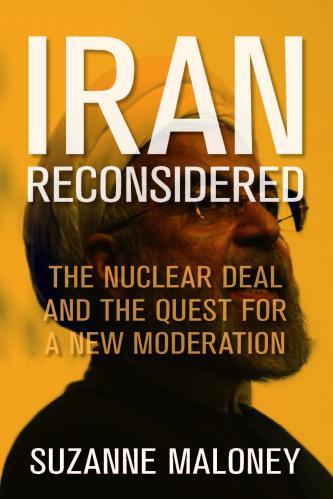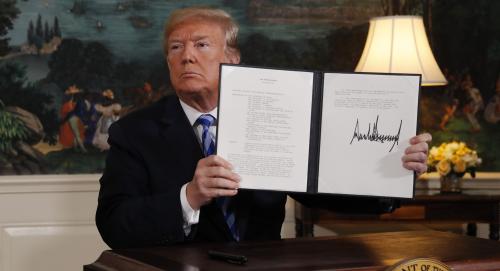This is the way the most significant instrument of U.S.-Iran diplomacy in 40 years ends: not with a bang, but with a whimper. In accordance with President Donald Trump’s May decision to walk away from the 2015 Iran nuclear deal, the administration on Tuesday re-imposed most of the sanctions originally suspended by the agreement. While the move produced a flurry of new headlines, for the most part the economic impact had already unfolded, and Iranian leaders took the opportunity to demonstrate cautious resolve, as they struggle to devise a viable strategy for managing an increasingly risky path forward.
Sanctions reactions
The executive order issued on Monday to reinstate the full force of American restrictions on much of Iran’s economy did not come as a surprise. In his May announcement on the nuclear deal, Trump announced two deadlines for winding down various types of business with Tehran, and with a few important exceptions, most affected firms and financial institutions moved quickly to comply with the renewed restrictions. The only real question surrounding this week’s deadline was the psychological impact on Iranians—not a small concern at a time when the value of Iran’s currency seemed to be entering a death spiral and small-scale but intense protests have mushroomed across the country.
For the moment anyway, it appears that Tehran’s proven crisis management capabilities remain intact. With a few overdue steps—including a change in the head of the Central Bank and a tweak to regulations surrounding the foreign exchange markets—and a somber address by Iranian President Hassan Rouhani broadcast live on state television, the Islamic Republic seems to have staved off any immediate panic. Since the sanctions deadline passed, the Iranian rial has rebounded, albeit very modestly, and Iranian leaders took some comfort in the robust symbolic and rhetorical support from Europe for preserving the nuclear agreement. The next cutoff date arrives in early November, and will prove more consequential as a barometer of impact on Iran’s crucial oil revenues.
Trump’s white whale
Still, even now, the American exit from the deal and intensification of economic pressure confronts both Tehran and Washington with an uncertain end game, complicated by the appearance, at least, of divisions within the political establishments in both countries. By demanding a blanket severance of its oil exports and all other trade as quickly as possible, Washington is seeking to apply maximum pressure on Iran with a sense of urgency that suggests a particular impatience for a quick result. But what, precisely?
For Trump himself, the lure of a bigger, better deal with Iran—or at least a camera-ready summit that lends the appearance of a breakthrough, as with North Korea—seems to loom large. Since he first jumped into the race for the presidency, he emphasized his unique capabilities to renegotiate “a new and lasting deal,” and the barrage of threats and appeals that he has directed at Tehran in recent weeks—to negotiate “any time they want” and with “no preconditions”—betray his exasperation that Iranian leaders have yet to take him up on the offer.
In that regard, it’s worth noting that the one venue where the American and Iranian presidents can be found on common turf—the annual U.N. General Assembly meetings in New York—is approaching quickly. Last year, Trump apparently sought an audience there with Rouhani, and there is already speculation about another try in September.
Trump’s foreign policy team surely has a more sophisticated understanding of Tehran’s particular blend of antipathy and defiance that has historically discouraged bilateral diplomacy. While National Security Advisor John Bolton and Secretary of State Mike Pompeo have publicly distanced themselves from past indulgences around regime change, their public statements emphasizing a dozen demands that sound suspiciously like preconditions and the “enormous changes” required of Tehran are tailor-made to reinforce Iranian aversion to direct dialogue with Washington. In the meantime, as Bolton pointed out in an interview with PBS NewsHour, the sanctions fuel “the collapse of the Iranian currency…and the protests we have seen all around Iran, from those in Tehran itself to small towns and villages, where the people are showing their enormous discontent with the regime of the ayatollahs.”
The president’s demonstrable determination to avoid another costly, protracted U.S. military engagement in the Middle East means that Washington will almost surely seek to avoid an escalation with Iran. But for a regime-changer, what’s not to like about continuing the status quo?
A skeptical Tehran
The menu of unpalatable options on offer from Washington leaves Tehran caught between a rock and a hard place. Waiting out the pressure is a possibility, as many Europeans have advised with an eye on the American political calendar or even the investigation into Russian election interference. And Tehran’s appetite for tactical escalation remains, if only to reinforce to Washington that its pressure comes at some cost. However, the mood on Iran’s streets appears volatile, and Iranian leaders appreciate from their previous ordeals that muddling through via sanctions workarounds doesn’t offer a sustainable formula for securing the revolutionary state through a period of anticipated transition, with a succession process for an aging supreme leader not far beyond the horizon.
In their public statements, Iranian leaders insist that no dialogue is possible with Washington until Trump reverses his abrogation of the nuclear deal and ceases the application of what they describe as psychological and economic warfare against Iran. The country’s ultimate authority, Ayatollah Ali Khamenei, has derided negotiations as “useless,” the commander of Iran’s Revolutionary Guards (IRGC) announced that Trump would take any hope of talking to the Islamic Republic “to his grave,” and Qasem Suleimani, the charismatic commander of Iran’s Quds Force, delivered a fiery speech threatening that Iran would end any war started by the United States and “destroy all that you possess.” In his televised statement on Monday, Rouhani advised: “If you’re an enemy and you stab the other person with a knife and then you say you want negotiations, then the first thing you have to do is remove the knife.”
Tehran’s public contempt for Trump and the current U.S. approach has bolstered a longstanding trope that Iranian leaders do not negotiate under pressure (see various interpretations on this theme from Iranian officials, their surrogates, and international analysts who advocate engagement with Tehran). In fact, this is pure posturing; on multiple occasions—including the diplomacy that produced the 1988 ceasefire with Iraq, a 2003 overture apparently endorsed by Iran’s Foreign Ministry for a “grand bargain” with Washington, and the 2013 interim nuclear agreement with Washington and its allies—the Iranian leadership has used negotiations to maneuver itself out of a dire predicament.
No one should be surprised if the Iranians decide to exploit Trump’s obvious eagerness for high-profile summitry.
So too, it appears that Trump’s aggressive policies have provoked at least the rudiments of a debate among the Iranian political establishment, and perhaps equally importantly among the public, about whether and how to take the president up on his intermittent appeals for talks. Ali Akbar Nateq Nouri, an influential cleric and politician, argued publicly last week that the option should be considered by the country’s national security council, and a mercurial conservative member of parliament seemed to chide the IRGC for provoking the crisis in the first place. Still other members of parliament shot back at the IRGC for its leaders’ public rhetoric toward Washington. And despite his dismissive comments Monday, Rouhani took pains to emphasize his government’s readiness for dialogue and even seemed to set the table for a broader negotiation with Washington, including new demands such as U.S. “compensation to the Iranian nation from 1953 until now…for its intervention in Iran.” All while murmurs of backchannel proposals conveyed via intermediaries such as Oman percolate.
It’s hardly a certainty, but no one should be surprised if the Iranians decide to exploit Trump’s obvious eagerness for high-profile summitry and put his vaunted negotiating skills to the test. That outcome would likely puncture another false construct, that peddled by the president and other opponents of the nuclear deal who remain convinced that a vastly better bargain can be struck with Tehran. Engineering a genuine “grand bargain” that resolves the core differences between the two countries would entail an investment of diplomatic energy and political will that neither side appears ready to proffer, especially since the existing situation suits most of the U.S. political establishment just fine.





Commentary
Trump wants a bigger, better deal with Iran. What does Tehran want?
August 8, 2018